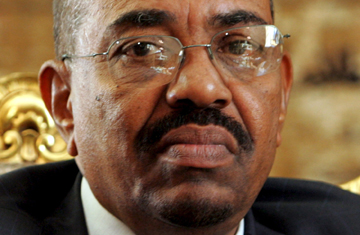
(4 of 5)
You feel that the failure to follow through on those promises was entirely due to the weakness of the United States government. Were there any actions by the Sudanese government that contributed to that as well?
Until now, no specific action has been required of us in order to have these punishments removed. We were asked to sign a peace agreement to have the punishments removed. We signed, and they have not been removed. We think that the most recent special envoy's efforts, General Gration, and the new direction the American administration is taking to change the policies of the previous administration, and not to fall [to the] same mistakes —we have great hope that these efforts. And with the complete cooperation between us and the American special envoy, we will normalize relations with the U.S.
There was a feeling among your advisors last year as the Bush Administration was winding down that there was a lost opportunity. That if a deal was not struck with Republicans, it couldn't possibly be struck with Democrats who are more hostile towards Sudan. Are you surprised so far by the Obama Administration?
Our relations with U.S. were at [their] worst in the nineties, during the Clinton administration. This is the period when we were bombed by U.S. missiles, sanctions were placed on us and Sudan was placed on the State Sponsors of Terror list. We think that the mistakes committed by the Republican administration cost the United States dearly, with losses in the lives of members of the armed forces in Iraq and Afghanistan, and a dire economic situation. Then with the slogan of "change" brought on by the Democrats and President Obama, we were not very optimistic.
Even when General Gration was appointed there were two opinions. [One held] that this general is coming to implement a "no-fly zone" in Darfur like he did in southern Iraq. We know that "no-fly zones" are not the policy of the armed forces nor General Gration, but the policy of the administration that General Gration and the armed forces implemented.
But we, the men of the military, were optimistic that a man of the military would come, not just because he was fellow military person, but because we know that men of the military are clear and say their opinion because the nature of their work is very dangerous since you are dealing with the lives of people. When you manage a war, the fuel of wars is people, be it from your side or your enemy's side. So you are dealing with a very dangerous issue and tend to be more objective than anyone else. General Gration did not disappoint us. He was very objective, courageous, and gave his opinion based on what he saw on the ground.
The Comprehensive Peace Agreement between north and south Sudan that ended more than 30 years of civil war ... was supposed to make unity attractive. But no one can say unity is attractive now. It seems undoubted that the south will vote to secede [in 2011]. If the south does vote to secede, what will be the north's reaction?
Giving the citizens of south Sudan the right to self-determination is something that all political forces agree on, be it the government or the opposition. Because the war lasted for long periods — the first war was for seventeen years and the second was for twenty years — we were convinced that unity cannot be imposed by force. The continuation of war is a continuation of distrust and hatred because war is all injustices.
In this situation we decided to give the south the right of self-determination and gave ourselves a period of six years with the goal of building trust between southern citizens and northern citizens and to cultivate a culture of peace, because most of the youth in the south today were born and raised during the war.
Our goal is to achieve development in the south that would convince southern citizens to vote for unity. We think that six years as a transitional period is a short time to rebuild an area the size of southern Sudan. It is not an easy task.
